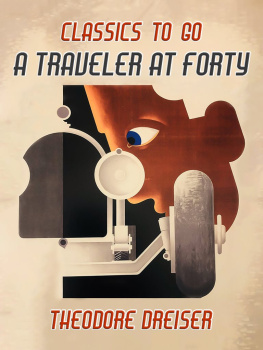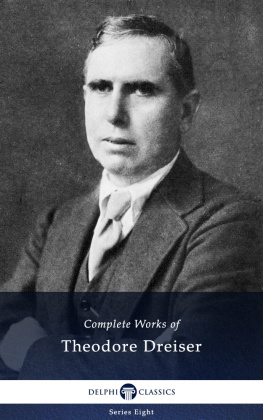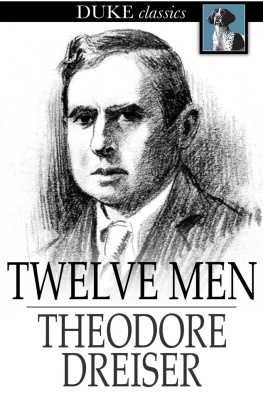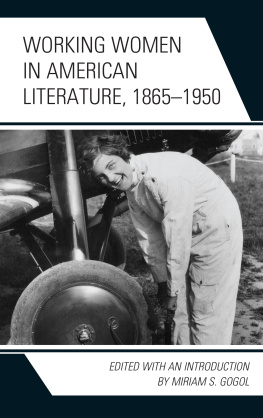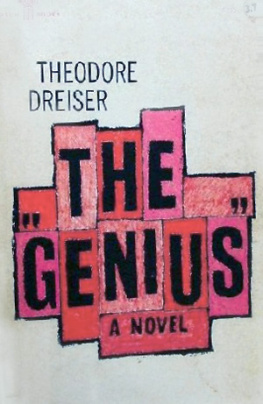Cover
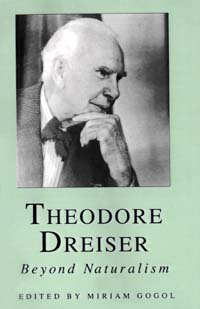
| title | : | Theodore Dreiser : Beyond Naturalism |
| author | : | Gogol, Miriam |
| publisher | : | New York University Press |
| isbn10 | asin | : | 0814730744 |
| print isbn13 | : | 9780814730744 |
| ebook isbn13 | : | 9780585385105 |
| language | : | English |
| subject | Dreiser, Theodore,--1871-1945--Criticism and interpretation, Naturalism in literature. |
| publication date | : | 1995 |
| lcc | : | PS3507.R55Z848 1995eb |
| ddc | : | 813/.52 |
| subject | : | Dreiser, Theodore,--1871-1945--Criticism and interpretation, Naturalism in literature. |
Page i
Theodore Dreiser
Beyond Naturalism
Edited by
Miriam Gogol

Page ii
NEW YORK UNIVERSITY PRESS
New York and London
Copyright 1995 New York University
All rights reserved
Cover art: From a photograph of Theodore Dreiser looking at a bust of John Cowper Powys. Hollywood, 1942. Reprinted with the permission of the University of Pennsylvania, Department of Special Collections.
Library of Congress Cataloging-in-Publication Data
Theodore Dreiser: beyond naturalism / edited by Miriam Gogol.
p. cm.
Includes index.
ISBN 0-8147-3073-6 (cloth : alk. paper).ISBN 0-8147-3074-4
(paperback : alk. paper)
1.Dreiser, Theodore, 18711945 Criticism and interpreta
tion.2.Naturalism in literature.I.Gogol,Miriam,1949 .
PS3507.R55Z848199595-14447
813'.52dc20CIP
New York University Press books are printed on acid-free paper, and their binding materials are chosen for their strength and durability.
Manufactured in the United States of America
Page iii
Contents
| Acknowledgments | v |
Introduction
Miriam Gogol | vii |
|
| Part IGender Studies: Women and Dreiser |
Dreiser and the Discourse of Gender
Shelley Fisher Fishkin | 1 |
Sexualizing the Female Body: Dreiser, Feminism, and Foucault
Irene Gammel | 31 |
Recontextualizing Dreiser: Gender, Class, and Sexuality in Jennie Gerhardt
Nancy Warner Barrineau | 55 |
|
| Part IIGender Studies: Men and Dreiser |
The Secrets of Fraternity: Men and Friendship in Sister Carrie
Scott Zaluda | 77 |
|
| Part IIIPsychoanalysis and Dreiser |
That oldest boy don't wanta be here: Fathers and Sons and the Dynamics of Shame in Theodore Dreiser's Novels
Miriam Gogol | 95 |
Page iv
Lacanian Equivocation in Sister Carrie, The Genius, and An American Tragedy
Leonard Cassuto | 112 |
|
| Part IVPhilosophy |
On Language and the Quest for Self-Fulfillment: A Heideggerian Perspective on Dreiser's Sister Carrie
Paul A. Orlov | 134 |
|
| Part VFilm Studies |
Squandered Possibilities: The Film Versions of Dreiser's Novels
Lawrence E. Hussman | 176 |
|
| Part VIPopular Literature |
Carrie's Library: Reading the Boundaries Between Popular and Serious Fiction
M. H. Dunlop | 201 |
|
| Part VIINew Historicism |
Sister Carrie's Absent Causes
James Livingston | 216 |
| Works Consulted | 247 |
| Contributors | 261 |
| Index | 263 |
Page v
Acknowledgments
I extend special thanks to Florian Stuber, Albert Ashforth, and Madelyn Larsen, all of whom gave very generously of their time in reading and revising portions of this book.
My gratitude is extended as well to the library staff of the Theodore Dreiser papers, Department of Special Collections, the University of Pennsylvania. Quotations from unpublished Dreiser manuscripts were used with the permission of The Trustees and copyrighted by them. Grateful acknowledgment is made to the University of Calgary Press for granting permission to reprint material in Irene Gammel's essay, Sexualizing the Female Body: Dreiser, Feminism and Foucault (Sexualizing Power in Naturalism [Calgary, 1994]) and to the University of North Carolina Press for permission to reprint sections of James Livingston's Sister Carrie's Absent Causes (Pragmatism and the Political Economy of Cultural Revolution, 18501940 [Chapel Hill, 1994]).
I also thank Zanvel A. Liff for his encouragement and inspiration over the years. Without his help, this volume would not have come into existence. I dedicate my portions of this book to D. Fred, Ariella, and F. Gogol.
Miriam Gogol
Page vi
This page intentionally left blank.
Page vii
Introduction
Miriam Gogol
To his contemporaries, Theodore Dreiser was best known for his naturalism and for his defiance of the genteel tradition of American letters. For most of his career, he was surrounded by notoriety, and after the publication, in 1925, of An American Tragedy, his name was a household word. Fifty thousand people bought copies in the first few years, many more read the book, and still more read of attempts in Boston to have the book banned. With time, though, naturalism became absorbed within the larger tradition of American writing, the genteel literary establishment lost its power to sway readers, and the controversies that swirled about Dreiser in his lifetime were largely resolved. Dreiser's reputation, however, has not merely survived; it continues to grow. Hardly a year passes that does not see the appearance of a new edition of Dreiser's writings, including such volumes as the unexpurgated Sister Carrie (1981), American Diaries, 19021926 (1982), An Amateur Laborer (1983), DreiserMencken Letters (1986), Newspaper Days (1991), and the restored Jennie Gerhardt (1992). And the works keep coming. New editions are planned from the University of Pennsylvania, the Library of America, and Oxford University Press.
Today Dreiser is considered a classic American writer and has a global following. His fiction is required reading in many American literature courses in colleges and universities in the United States and abroad, including universities in India, Japan, China, Germany, Hungary, and the former Communist-bloc countries. His work is also heavily anthologized.
To a large extent, Dreiser's strength of character has contributed to his enduring popularity with readers. Where other writers succumb to the urge to judge and censor, Dreiser merely describes. He told the truth as he saw it, and in doing so, he focused on
Next page


